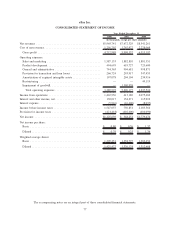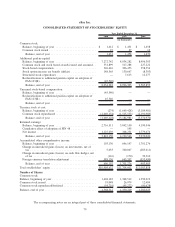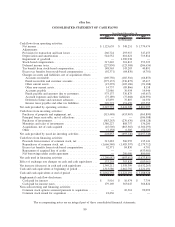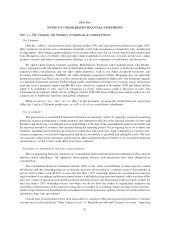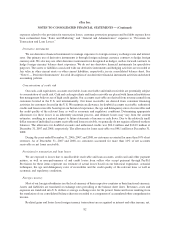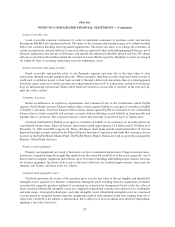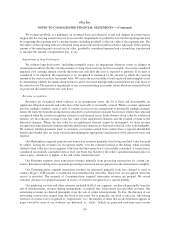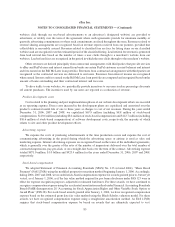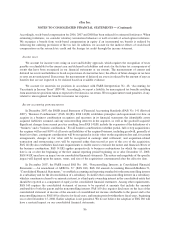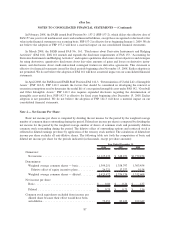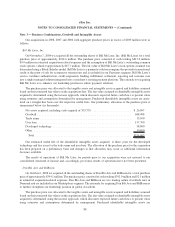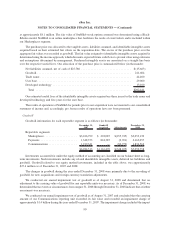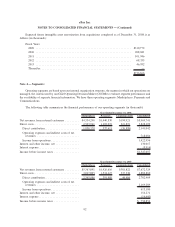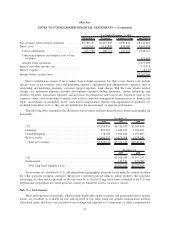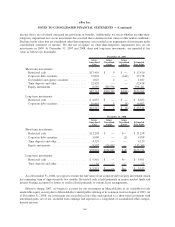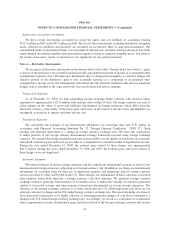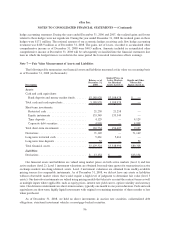eBay 2008 Annual Report Download - page 94
Download and view the complete annual report
Please find page 94 of the 2008 eBay annual report below. You can navigate through the pages in the report by either clicking on the pages listed below, or by using the keyword search tool below to find specific information within the annual report.Accordingly, stock-based compensation for 2006, 2007 and 2008 has been reduced for estimated forfeitures. When
estimating forfeitures, we consider voluntary termination behaviors as well as trends of actual option forfeitures.
We recognize a benefit from stock-based compensation in equity if an incremental tax benefit is realized by
following the ordering provisions of the tax law. In addition, we account for the indirect effects of stock-based
compensation on the research tax credit and the foreign tax credit through the income statement.
Income taxes
We account for income taxes using an asset and liability approach, which requires the recognition of taxes
payable or refundable for the current year and deferred tax liabilities and assets for the future tax consequences of
events that have been recognized in our financial statements or tax returns. The measurement of current and
deferred tax assets and liabilities is based on provisions of enacted tax laws; the effects of future changes in tax laws
or rates are not anticipated. If necessary, the measurement of deferred tax assets is reduced by the amount of any tax
benefits that are not expected to be realized based on available evidence.
We account for uncertain tax positions in accordance with FASB Interpretation No. 48, “Accounting for
Uncertainty in Income Taxes” (FIN 48). Accordingly, we report a liability for unrecognized tax benefits resulting
from uncertain tax positions taken or expected to be taken in a tax return. We recognize interest and penalties, if any,
related to unrecognized tax benefits in income tax expense.
Recent accounting pronouncements
In December 2007, the FASB issued Statement of Financial Accounting Standards (FAS) No. 141 (Revised
2007), “Business Combinations” (FAS 141(R)). FAS 141(R) establishes principles and requirements for how an
acquirer in a business combination recognizes and measures in its financial statements the identifiable assets
acquired, liabilities assumed, and any noncontrolling interests in the acquiree, as well as the goodwill acquired.
Significant changes from current practice resulting from FAS 141(R) include the expansion of the definitions of a
“business” and a “business combination.” For all business combinations (whether partial, full or step acquisitions),
the acquirer will record 100% of all assets and liabilities of the acquired business, including goodwill, generally at
their fair values; contingent consideration will be recognized at its fair value on the acquisition date and, for certain
arrangements, changes in fair value will be recognized in earnings until settlement; and acquisition-related
transaction and restructuring costs will be expensed rather than treated as part of the cost of the acquisition.
FAS 141(R) also establishes disclosure requirements to enable users to evaluate the nature and financial effects of
the business combination. FAS 141(R) applies prospectively to business combinations for which the acquisition
date is on or after the beginning of the first annual reporting period beginning on or after December 15, 2008.
FAS 141(R) may have an impact on our consolidated financial statements. The nature and magnitude of the specific
impact will depend upon the nature, terms, and size of the acquisitions consummated after the effective date.
In December 2007, the FASB issued FAS No. 160, “Noncontrolling Interests in Consolidated Financial
Statements — An amendment of ARB No. 51” (FAS 160). FAS 160 amends Accounting Research Bulletin 51,
“Consolidated Financial Statements,” to establish accounting and reporting standards for the noncontrolling interest
in a subsidiary and for the deconsolidation of a subsidiary. It clarifies that a noncontrolling interest in a subsidiary,
which is sometimes referred to as minority interest, is a third-party ownership interest in the consolidated entity that
should be reported as a component of equity in the consolidated financial statements. Among other requirements,
FAS 160 requires the consolidated statement of income to be reported at amounts that include the amounts
attributable to both the parent and the noncontrolling interest. FAS 160 also requires disclosure on the face of the
consolidated statement of income of the amounts of consolidated net income attributable to the parent and to the
noncontrolling interest. FAS 160 is effective for fiscal years, and interim periods within those fiscal years, beginning
on or after December 15, 2008. Earlier adoption is not permitted. We do not believe the adoption of FAS 160 will
have a material impact on our consolidated financial statements.
86
eBay Inc.
NOTES TO CONSOLIDATED FINANCIAL STATEMENTS — (Continued)



